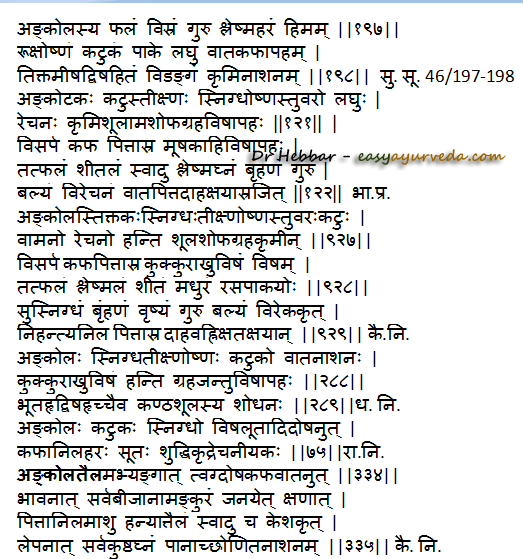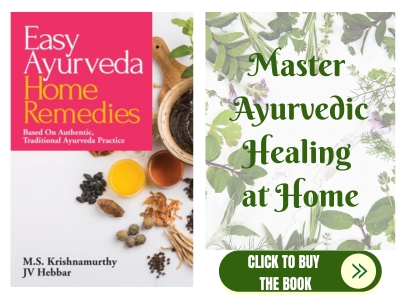Alangium salvifolium: Ankola Uses, Dose, Research, Side Effects
Ankola or Ankota – Alangium salvifolium is used in Ayurveda for treating herpes, rodent bites, dog bite, poisoning etc. It is also used for inducing Vamana and Virechana Panchakarma therapies.
Botanical name- Alangium Salvifolium (linn.f)Wang / Alangium salviifolium
Family- Alangiaceae (Ankola kula)
Table of Contents
Vernacular names
Names in different languages:
English name – Sage leaved alangium
Hindi name- Dhera, Ankol
Tamil name- Elangi, Alandi
Malayalam Name- Irinzil
Telugu name – Uduga Chettu, Ankolamu
Bengali name – Aankod, Badh Ankod
Marathi, Gujarati name – Ankol
Malayalam name – Irinjil, Angolam
Kannada name – Ankola
Tamil name – Elangi
Taxonomy
Botanical Name : Alangium salvifolium
Synonyms : Alangium lamarckii
Class : Dicotyledons
Sub-class : Polypetalae
Series : Calyciflorae
Order : Cornales
Family : Alangiaceae
Genus : Alangium
Species : A. salviifolium
Sanskrit synonyms
Ankota, Ankola, Nikochaka, Peetasara, Hundika, Rudamallika, Kotara, Gudhapatra, Madana,
Rechi – useful in Virechana (Purgation) Panchakarma therapy
Gandhapushpa – fragrant flowers
Irikilla, Bhusita,
Guptasneha – yields oil
Tamraphala – Fruits of Ankola copper coloured on ripening
Lambhakarna – Leaves are long and Ear shaped
Deergha Keela – Long spines
Classical categorisation
Bhavaprakasha, Dhanvantari Nighantu – Guduchyadi Varga
Kaiyadeva Nighantu – Oshadhi Varga
Raja Nighantu – Prabhadradi Varga
Chemical composition
Alangium Salvifolium chemical composition:
Alangine, Marckine, Marckidine,Lamarckinine, Alangicine, Ankorine, Alangimarckine, Alangamide
(Reference: Dravyaguna Vijnana, JLN Sastry)
Leaf has alkaloids, fixed oils, fats, proteins, amino acids, carbohydrate, glycosides
Medicinal properties
Alangium Salvifolium medicinal properties:
Rasa (taste) – Tikta – bitter, Katu – Pungent, Kashaya – astringent
Guna (qualities) – Laghu – light to digest, Snigdha – unctuous, oily, Teekshna – strong, piercing
Vipaka- Katu – Undergoes pungent taste conversion after digestion
Veerya – Ushna – Hot potency
Effect on Tridosha: Balances Kapha and Pitta Dosha
Pharmacological action – Anthelmintic, Thermogenic, Diuretic, Purgative
Part used, dosage
Part used- Root bark, seed, seed oil
Dosage-
powder 1-2 g (3-6 g for Vamana therapy)
Decoction 50-100 ml
Formulations (Yoga)
Ankola mula kalka
Ankoladi taila
Ankola ghrita
Sanskrit verse

Medicinal uses
Alangium salvifolium medicinal uses:
A medicated oil prepared with Ankola fruit, Devadaru (Cedrus deodara), garlic, ginger etc herb is used for treating ear disorders. The herbal oil is used as ear drops. (Reference: Sushruta Samhita Uttaratantra 21/14-16)
Ankola Fruit:
Guru – heavy
Balances Kapha Dosha
Hima – coolant
Brumhana – improves nourishment
Balya – improves strength and immunity
Virechana – purgative
Indicated in –
Daha – internal burning sensation, seen in Pitta imbalance conditions such as gastritis, sore throat, laryngitis, sun stroke etc
Kshaya – tuberculosis, chronic respiratory diseases wasting of muscles
Vamaka – useful in Vamana Panchakarma therapy
Bark and seed:
Katu – pungent
Teekshna – Piercing, strong
Snigdha – unctuous, oily
ushna – hot
Tuvara – astringent
Laghu – light to digest
Rechana – acts as purgative
Indicated in –
Krumi – worm infestation (in wounds and in intestines)
Shoola – abdominal colic
Ama – a product of altered digestion and metabolism
Shopha – oedema,
Graharoga – psychological disorders
Visha – toxic conditions
Visarpa – Herpes
Kapha and Pitta imbalance disorders
Asra –blood vitiation disorders such as abscess, bleeding disorders, vascular disorders etc
Mushaka – rodent bite
Ahivisha – snake bite
Kukkuravisha – dog bite
Akhu visha – rat bite
Ankola taila – Seed oil:
It is used for massage to relieve
Twak Dosha – skin disorders, for skin detoxification
Kaphavatahara – balances Kapha and Vata Dosha
Keshakrut – improves hair quality and length
Kushtaghna – useful in wide range of skin disorders
Panat Shonitanashana – Oral intake is useful in blood disorders such as abscess, bleeding disorders, vascular disorders etc
The seed oil is used for Nasya for anti aging treatment.
Side effects, research
Side effects:
Due to its emetic and purgative action, its fruits and seeds should only be used under medical supervision.
Research:
Anti diabetic and hypoglycemic activity of aqueous extract of stem and leaves.
Anti oxidant and antimicrobial activity of root
Interaction with medicines, supplements
Can this be used while taking Homeopathic medicine?
Yes. This product does not react with homeopathic medicine.
Can this medicine be continued while taking supplements like multivitamin tablets, Omega 3 fatty acids etc?
Yes. Generally, this product goes well with most dietary supplements. However, if you are taking more than one product per day, please consult your doctor for an opinion.
With western
medicines
Seek your
doctor’s advice if you are taking this product along with other western
(allopathic / modern) medicines. Some Ayurvedic herbs can interact with modern
medicine.
If both Ayurvedic and allopathic medicines are advised together, then it is
best to take Allopathic medicine first, wait for 30 minutes and then take the
Ayurvedic medicine.
Morphology
Small tree with spinescent branches
Bark – Light coloured
Leaf – Oblong or ovate lanceolate, acuminate tip, entire margin, glabrous above, reticulate veined
Flowers – Few in axillary fascicles, densely pubescent
Fruit – Globular, purplish red in color
Part used – Root, Root bark, Leaf, Fruit, Seed
Sthanika karma (Action on different system)
External application – Oil processes Analgesic and wound healing properties. bark paste is used in animal poisoning to relieve pain and edema.
Nervous system – Indicated in Osteoarthritis, Neurological pain etc.
Digestive system – Purgative, Anti colic, Anti helminthic, Liver stimulant. Indicated in Ascites, Hemorrhoids, Helminthiasis etc.
Respiratory system – Pacifies kapha dosha. Indicated in cough and breathing disorders, rhinitis. Seed powder nasya is indicated in disorders of kaphaja origin. Flower juice along with pippali powder and honey can be given in Asthmatic conditions. Leha prepared out of it is also beneficial in such conditions.
Circulatory System – Indicated in Hypertension. It immediately reduces blood pressure by dilating the blood vessels.
Excretory system – Indicated in UTI. increases urine output.
Satmikarana – Bark decoction is indicated in animal poisons. Fruit is indicated in tuberculosis, epistaxis etc. Nasya with its oil has Aphrodisiac action.
Skin – Indicated in skin disorders (Kushta, Visharpa, Firanga (Syphilis) )
Tapakrama – Antipyretic, fruit relieves burning sensation.










